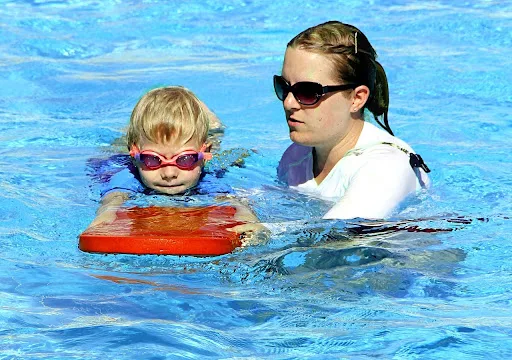5 minute read
Swimming is a fundamental life skill, yet many parents delay teaching their kids until much later than they should. Delaying this crucial skill can mean missing out on numerous benefits, whether due to logistical challenges or simply not perceiving its urgency. This blog explores why getting children into the pool early is not just beneficial — it’s essential. From safety to physical development, early swimming lessons offer advantages for your little ones.

Why Start Young The Importance of Early Swimming Lessons
Introducing your child to the water early can have lasting benefits beyond the pool. Young children are naturally more receptive to learning new skills, and swimming is no exception. The earlier you start, the quicker they adapt to the water and build confidence. In this case, consider enrolling them in British Swim School lessons for babies because there’s also a practical side to early swimming lessons. Young kids have fewer inhibitions and less fear of the water, making instruction easier and less stressful. This receptivity to new experiences can make early swimming lessons less of a chore and more of an adventure.
1. Safety First: Reduced Risk of Accidents
The primary reason to teach kids to swim early is safety. Water safety is not merely about avoiding accidents but equipping your child with the skills and confidence they need to handle themselves in potentially dangerous situations. Swimming lessons significantly lower the risk of drowning. Children learning to swim early are more likely to become proficient swimmers, reducing their risk in pool and open water settings. This proactive approach equips children with the necessary skills to stay safe while enjoying the water.
2. Physical Development: Boost Building Strong Bodies
Swimming is not only fun but also an excellent form of exercise that promotes physical development. When kids swim, they engage various muscle groups simultaneously, resulting in a full-body workout. It’s ideal for young children whose bodies are still developing. The resistance of the water provides a gentle but effective form of strength training. It helps build muscle tone and endurance without the risk of injury that often accompanies other high-impact activities. This physical activity is crucial for young children, promoting healthy bone growth and joint flexibility.
3. Cognitive Benefits: How Swimming Enhances Brain Development
Swimming has been found to have significant cognitive benefits for children. Research shows that physical activity can enhance brain function, and swimming is no exception. The complex movements involved require coordination between the mind and body, stimulating brain growth and development. Children who swim from an early age often display superior problem-solving skills. Swimming involves numerous simultaneous actions, requiring kids to think critically and adapt to changing circumstances. This mental exercise can improve cognitive abilities that are transferable to other areas of life.
4. Social Skills: Swimming Builds Community and Confidence
Swimming lessons aren’t just about learning a new skill; they’re also a fantastic way for kids to develop social skills. Whether in group classes or team settings, swimming offers opportunities for children to interact, cooperate, and communicate with peers. Participation in swim classes fosters a sense of belonging and community among young swimmers.
Kids learn to work together, encourage each other, and celebrate collective achievements. These experiences help build self-esteem and confidence, which are essential to healthy childhood development. Additionally, mastering swimming skills early instills a sense of accomplishment and pride in children. Overcoming challenges and progressing through various levels of competence boosts self-confidence.
5. Emotional Well-being: Swimming as a Stress Reliever
Swimming is not just physically rewarding; it’s also emotionally beneficial. The soothing nature of water can have a calming effect on children, reducing stress and anxiety. This is particularly important in today’s fast-paced world, where children are often exposed to numerous stressors. Being in the water promotes relaxation as it supports the body and relieves tension. Swimming’s repetitive nature is especially beneficial for children who may struggle with hyperactivity or anxiety. Furthermore, the endorphins released during physical activity enhance mood and emotional well-being. Regular swimming can lead to a happier, more balanced child equipped with the emotional resilience to face life’s challenges.
6. Long-term Love for Fitness: Instilling Healthy Habits Early
Teaching a child to swim early promotes a lifelong appreciation for physical activity. Swimming offers various avenues for continued participation, from competitive swimming to leisure activities. Children exposed to these possibilities early on are more likely to explore and engage in different forms of physical activity. Additionally, swimming can be a gateway to other water-based activities. Once a child is comfortable in the water, they may develop an interest in related activities like snorkeling, surfing, or kayaking. These pursuits further expand their horizons and contribute to a well-rounded lifestyle.
Teaching your child to swim early is one of the greatest gifts you can give them. The benefits are numerous and far-reaching, from safety to physical and cognitive development. By introducing your child to swimming, you equip them with valuable skills to serve them throughout their lives. A positive and supportive approach will foster a love for swimming that lasts a lifetime.




